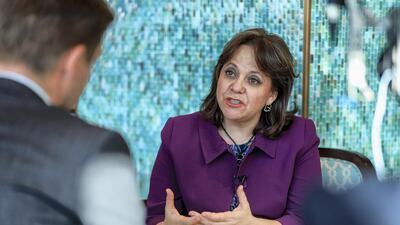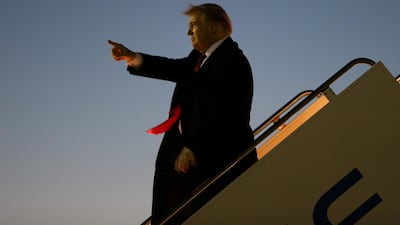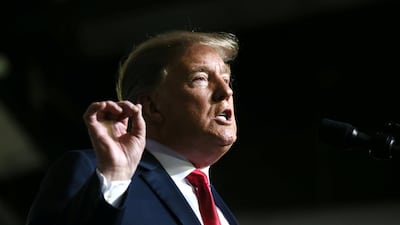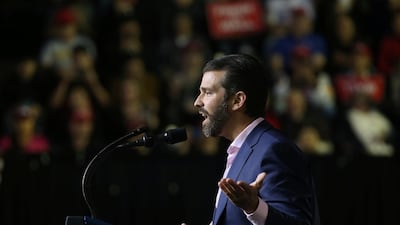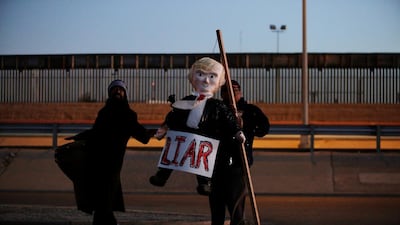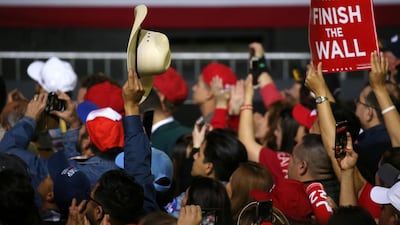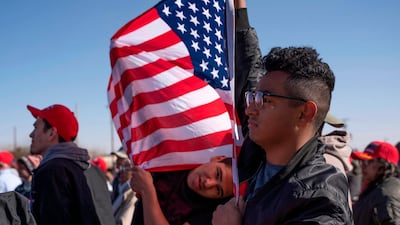How should Mexico handle Donald Trump?
“I’m afraid we will need psychological advice,” wrote Martha Delgado, on her Twitter account, in response to a magazine article posing that question days before his inauguration as the president in early 2017. In another Tweet, the following March, she described a Trump “tantrum” as she shared a video of him meeting who she described as the “real leader of the free world", Germany’s Angela Merkel.
Ms Delgado, who was confirmed last month as undersecretary for multilateral affairs and human rights in Mexico’s department of foreign affairs, is already learning to be more diplomatic.
A former environment secretary in Mexico City, she admits frustration at her country’s richer neighbour’s decision to abandon the Paris climate deal. But she quickly points to “excellent” work being carried out at state level, for example in California.
Asked about her “psychological help” comment, she now insists she does not want to personalise the issue, despite Mr Trump’s regular provocations, often issued through his own Twitter account. Americans and Mexicans generally get on well, she said.
There is one issue though where she is not willing to bite her tongue – the Republican’s proposals for a border wall.
The barrier or "steel slats" has been a major issue over recent months, leading to the longest government shutdown in US history. As of Tuesday, an agreement, at least in principle, has now been reached.
“The proposal is aggressive for Mexicans,” the vice minister said. “But also it is not doable. I mean, if you understand what is happening in the border line, [a wall] is not just expensive, it is not effective. A lot of people are crossing not because there is not a wall.
“They are crossing by plane, by tunnels, crossing with a passport in their hand but they later become illegal.
"It [the wall] is not a solution and from our perspective building wall is a very, very old policy... that hasn’t worked... so it is not going to work in the future."
Asked to explain Mr Trump's fixation with the wall, she suggests it is a ploy to win votes. “[Trump’s] electoral base is convinced that they are right to avoid immigration to the United States, not just from Mexicans but from Central American people,” she said.
And what about Mr Trump’s pledge, made repeatedly, that Mexico would also foot the bill for the wall? “Mexico has never accepted that and is not going to,” Ms Delgado said. “It is not a discussion in Mexico, we know we are not going to do that.
“But the relationship between Americans and Mexicans as neighbours has been strong and good for a long time. Mexican persons in America have enriched the culture and are doing important things in American society. That’s what we want to be recognised for, rather than some exceptions of violence or felons.”
It is just not the relationship with the US though, that Mexico is now grappling with. Venezuela is in crisis and governments around the world have recognised Juan Guaido, the opposition leader, as President instead of the incumbent Nicolas Maduro. Ties between Mexico and Mr Maduro were once tense, but are said to have warmed following the inauguration of Andres Manuel Lopez Obrador, Mexico's new left wing, populist president, in December.
“Mexico’s position is difficult,” Ms Delgado admits. “But it is easy to understand. Mexico is proposing to set up a table for dialogue among the parties that are not in agreement.
"The dialogue is far from being arranged right now but maybe in the middle term some other countries will adopt this vision also.” For now, she says, Maduro is still recognised by Mexico as Venezuela’s leader.
However, she says her country is ready to take in refugees from Venezuela, and has done already, during the country’s current troubles.
“Maybe the numbers are going to increase in the near future, but [taking them in] is what we have been doing in recent years and we are still doing that.”
At home, meanwhile, the new administration is working hard to root out corruption and improve welfare schemes.
Further progress is planned to promote happiness among Mexicans, an area that, on a series of measures, the country is already performing well on.
_____________
Trump's 'Finish the Wall' rally in El Paso
_____________
According to the Happy Planet Index, which considers factors such as life expectancy and inequality levels, Mexico is the second happiest country on Earth, behind Costa Rica, in a league table of 140. By the UN’s measure, it is 24th of 154 countries in terms of happiness, despite relatively high levels of poverty.
“There are a lot of criteria to establish happiness,” Ms Delgado said. “But Mexican people have some values that allow us to be happy – family, parties and enjoying simple things of life.
"But also we have had some structural changes in our communities - such as violence, corruption – which are making people not so happy. We have to set up a new plan in order to fulfill specific goals of wellness,” she said.
Dubai, in particular, is being looked to by Mexico for ideas around happiness promotion. Among measures already put in place by the new administration there, is rebranding government departments. The Ministry of Social Development has become the Ministry of Wellness, for instance.
More co-operation in tourism and commerce is also planned, and it is hoped that an announcement will be made soon around a first “direct” flight between Dubai and Mexico, even if planes are required to stop off briefly in Spain, which may have to be used as a bridgehead.
Solar energy is another area of mutual interest, said Ms Delgado, who was in the UAE for the World Government Summit.
“Here, I think that we can find some values that we need to develop in Mexico,” she said, reflecting on what she had found in the UAE.
“To be proud, for example, to have courage and achieve things, ambitious things. We have to learn that in my country and maybe this country can help us.
“We see here they have achieved a lot of things in the economical field in a very short term. And we’ve spent a lot of decades in Mexico trying to develop our economy. So we need to think how to change these models we have had in the past, to speed up our development.
“Mexico is a country that is full of oil, sun, sea, resources, trees, we have everything. But [it has been] mismanaged. You come here and you see that this is a desert – sand and what? No water around. And they succeed.
“So it is interesting how to succeed surrounded by sand. Maybe [it is about] a lot of people with courage and a government that is determined to pursue specific goals for the future. In Latin America, we have to learn how to grow that mindset,” said Ms Delgado.
